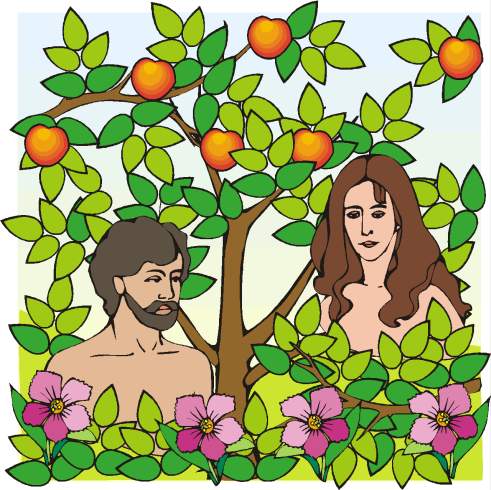 In the book of Genesis we read, “The LORD God took the man and put him in the garden of Eden to till it and keep it. And the LORD God commanded the man, ‘You may freely eat of every tree of the garden; but of the tree of the knowledge of good and evil you shall not eat, for in the day that you eat of it you shall die” (Gen 2.15-17).
In the book of Genesis we read, “The LORD God took the man and put him in the garden of Eden to till it and keep it. And the LORD God commanded the man, ‘You may freely eat of every tree of the garden; but of the tree of the knowledge of good and evil you shall not eat, for in the day that you eat of it you shall die” (Gen 2.15-17).
Then the text says God made Eve (Gen 2.18-24). But it does not say anything about either God or Adam telling Eve about the command not to eat fruit from the forbidden tree.
In the next chapter, in Genesis 3, the serpent appears and tempts Eve to take fruit from the forbidden tree and eat it. She replies by telling the serpent that God has told them not to do that (Gen 3.1-3). Thus, the reader must understand that most likely Adam, but perhaps God, told this to Eve. This is an example of how some information in biblical narratives, especially those in Genesis because they need to be brief, is intended by the author for the reader to assume. The reason is obvious. It often was imperative for ancient documents to be written in short compass.
Then when Adam and Eve ate fruit of the forbidden tree, they did not immediately die as most readers of Genesis have expected and that God predicted they would. There is no problem for readers regarding Eve’s remark, that “you shall die” (Gen 3.3). Why? It does not specify a certain time they would die. In contrast, God earlier had specified the time they would die by saying to Adam, “in the day that you eat of it you shall die.”
But Adam and Eve did not die the day they ate of the forbidden fruit. Rather, they lived hundreds of years later until they died. Regarding Adam alone, we read later, “Thus all the days that Adam lived were nine hundred thirty years; and he died” (Gen 5.5).
So, both Bible scholars and general readers of the Bible have regarded this scenario in the book of Genesis about initial death to be a conundrum that needs some kind of explanation or else it must be dismissed as a discrepancy. Well, there have been many suggestions about how to do this–how to reconcile Gen 2.17 with the fact that Adam ate of the forbidden tree but didn’t die until perhaps nearly a thousand years later.
I am a member of the Society of Biblical Literature (SBL). Every year for nearly the past twenty years I have attended SBL’s Annual Meeting. It is always scheduled in a different, large North American city the weekend prior to Thanksgiving. Its primary feature is that so many scholars deliver papers, being about 20-30 minutes in length, at hundreds of sessions, and almost all of it is about the Bible.
I just glanced through the program for this year’s SBL Annual Meeting and noticed that Professor Jason A. Riley of Fuller Theological Seminary (Pasadena, CA) will be delivering a 30-minute paper entitled “The Legal Loophole in Gen 2:17: ‘You Shall Die’ but you Shall Not Live.” The following is his abstract describing the paper’s content:
“The delay of the death sentence in Genesis 2-3 has been a source of consternation for readers of the Bible as early as the second century B.C. (e.g., the book of Jubilees might provide the earliest interpretation of the death sentence; see Jub 4:29-30). Over the past two-thousand years, scholars have attempted to explain the apparent contradiction between the explicit death sentence in Gen 2:17 and the fact that Adam and Eve do not die on the day in which they ate the fruit of the tree of good and evil. Explanations range widely, e.g., (1) Yhwh meant that Adam and Eve would become mortal, (2) the punishment only seemed delayed but was ultimately carried out because of the meaning of the infinitive absolute (Hamilton, Speiser) or because a day to God is like a thousand years and Adam only lived 930 years (Jubilees), (3) the death that Yhwh referred to was spiritual death (Augustine), (4) Yhwh demonstrated mercy by not killing Adam and Eve, (5) withdrawing the possibility of rejuvenation by the tree of life (Sarna) by (6) expulsion from the garden was more catastrophic than death (Sarna, Wenham), or that (7) God simply changed his mind (Skinner). Many explanations for the apparent contradiction in the text are often influenced by the interpreters’ theological presuppositions and rarely incorporate comparative data from the ancient Near East. This paper will argue that there is a simple literary explanation for the fact that the death sentence is not immediately carried out, and that this literary reason is made possible by the legal language used by Yhwh in Gen 2:17. The legal phrase ‘you shall die’ is understood by comparison with legal terminology used throughout the ancient Near East and in the Hebrew Bible, first employed in the Laws of Eshnunna.”
I don’t know about the legal language he mentions, so maybe I will attend this lecture. However, I notice that among the many interpretations he mentions that have been offered throughout church history to try to solve this puzzle, he does not mention the one I have been believing for many years now. And I don’t know if there are scholars who propose it. I haven’t read it in any of my commentaries on Genesis.
Here it is: Adam and Eve began to die on the very day they ate of the forbidden fruit because that is when the death principle entered into their bodies. What is the death principle? Cells in our bodies are dying every day. Fortunately, new cells naturally are being created to take their places. But when we grow old, more cells are dying than new cells are being generated to take their places. Thus, when Adam and Eve ate of the forbidden fruit, for the first time cells in their bodies began to die. That is what God meant when he said, “in the day that you eat of it you shall die.” Yet it took hundreds of years before enough body cells were dying that brought the death of the entire body of Adam and the body of Eve.
Your thoughts!












